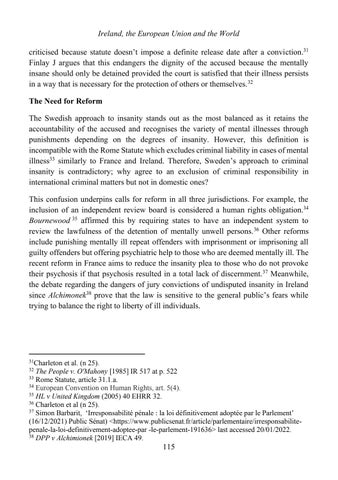Ireland, the European Union and the World criticised because statute doesn’t impose a definite release date after a conviction.31 Finlay J argues that this endangers the dignity of the accused because the mentally insane should only be detained provided the court is satisfied that their illness persists in a way that is necessary for the protection of others or themselves. 32 The Need for Reform The Swedish approach to insanity stands out as the most balanced as it retains the accountability of the accused and recognises the variety of mental illnesses through punishments depending on the degrees of insanity. However, this definition is incompatible with the Rome Statute which excludes criminal liability in cases of mental illness33 similarly to France and Ireland. Therefore, Sweden’s approach to criminal insanity is contradictory; why agree to an exclusion of criminal responsibility in international criminal matters but not in domestic ones? This confusion underpins calls for reform in all three jurisdictions. For example, the inclusion of an independent review board is considered a human rights obligation.34 Bournewood 35 affirmed this by requiring states to have an independent system to review the lawfulness of the detention of mentally unwell persons. 36 Other reforms include punishing mentally ill repeat offenders with imprisonment or imprisoning all guilty offenders but offering psychiatric help to those who are deemed mentally ill. The recent reform in France aims to reduce the insanity plea to those who do not provoke their psychosis if that psychosis resulted in a total lack of discernment. 37 Meanwhile, the debate regarding the dangers of jury convictions of undisputed insanity in Ireland since Alchimonek38 prove that the law is sensitive to the general public’s fears while trying to balance the right to liberty of ill individuals.
31Charleton
et al. (n 25). The People v. O'Mahony [1985] IR 517 at p. 522 33 Rome Statute, article 31.1.a. 34 European Convention on Human Rights, art. 5(4). 35 HL v United Kingdom (2005) 40 EHRR 32. 36 Charleton et al (n 25). 37 Simon Barbarit, ‘Irresponsabilité pénale : la loi définitivement adoptée par le Parlement’ (16/12/2021) Public Sénat) <https://www.publicsenat.fr/article/parlementaire/irresponsabilitepenale-la-loi-definitivement-adoptee-par -le-parlement-191636> last accessed 20/01/2022. 38 DPP v Alchimionek [2019] IECA 49. 32
115

